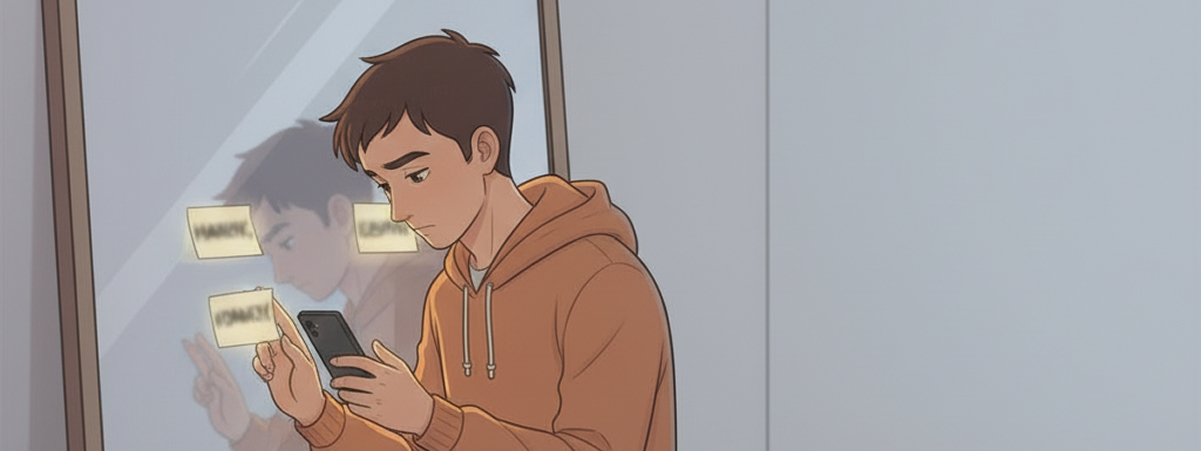"I'm useless." "I'm a failure." "I'm too sensitive." "I'm incapable." These killer phrases, you might repeat them to yourself daily. Instead of describing a specific action or behavior, you stick a definitive label on your entire identity.
This tendency to define yourself globally by your mistakes or flaws is called negative labeling, and it can destroy your self-esteem if you're not careful.
What is negative labeling?
Negative labeling is a cognitive bias where we attribute global and permanent negative characteristics to ourselves based on specific events or behaviors. Instead of saying "I made a mistake," we tell ourselves "I am a mistake." Instead of "I behaved badly," we think "I am a bad person."
This distortion transforms temporary experiences into definitive verdicts about our identity. It creates what psychologists call a "labeling effect": the more we repeat these negative judgments, the more we end up conforming to them.
5 signs you practice negative labeling
- Globalizing vocabulary after failure
As soon as something goes wrong, you use words like "always," "never," "I am," "I'm worthless" rather than describing the specific situation. - Identity defined by weaknesses
You introduce yourself to others by highlighting your flaws: "I'm not good at that," "I'm a complicated person," "I'm not interesting." - Resistance to compliments
When someone gives you a compliment, you automatically reject it because it doesn't match the negative image you have of yourself. - Self-fulfilling prophecies
Your negative labels influence your behaviors: convinced you're "bad at relationships," you avoid social interactions, confirming your belief. - Constant unfavorable comparison
You systematically compare yourself to others by highlighting your shortcomings: "She's intelligent, I'm stupid," "He's funny, I'm boring."
Where do these toxic labels come from?
- Internalized childhood messages
Repeated criticism during childhood ("You're lazy," "You never do anything right") can become deeply anchored and become our inner dialogue. - Perfectionism and intolerance for error
Perfectionistic people tend to interpret any failure as proof of their global inadequacy rather than as a learning experience. - Excessive social comparison
In a performance-oriented society, we often internalize external standards and judge ourselves harshly when we don't meet them. - Traumatic experiences
Painful events can create negative beliefs about oneself: "If this happened to me, I must have deserved it, so I'm worthless".
The ravages of negative self-labeling
- Limited possibilities
Convinced you're "bad at math" or "incapable of public speaking," you close doors without even trying. - Degraded self-esteem
These negative labels create a persistent feeling of devaluation that can lead to depression. - Affected relationships
Negative labeling influences how you present yourself to others and can create dysfunctional relational dynamics. - Vicious cycle of failure
The more you believe you're incapable, the less you try, the less you succeed, the more you confirm your negative labels.
5 strategies to free yourself from toxic labels
- Replace being with doing
Instead of "I'm useless," say "I did this task poorly." Instead of "I'm stupid," say "I made a decision I regret." This nuance changes everything. - Add temporal nuances
Transform "I never know what to say" into "Right now, I have trouble finding my words in this type of situation." The "right now" opens the possibility of change. - Look for counter-examples
For each negative label, find at least three moments when you acted differently. If you think you're "selfish," remember times when you helped someone. - Practice self-compassion
Talk to yourself like you would talk to a dear friend. You would never tell a loved one "You're useless," so why inflict this violence on yourself? - Focus on your actions and values
Define yourself by what you do and what you believe in rather than by your occasional failures. "I am someone who tries," "I am someone who learns."
AI help to identify your labeling patterns
An app like Anima can detect when you use negative labeling language by analyzing your vocal expressions. It can offer more benevolent reformulations in real-time.
Example dialogue with Anima's AI:
User: "I messed up my presentation again. I'm really useless, I don't know why I still try."
Anima: "I notice you're moving from a specific event (the presentation) to a global judgment about yourself. What if we reframed this? Instead of 'I'm useless,' how about 'this presentation didn't go as I hoped'? This opens up more possibilities for next time."
This mood tracker functionality helps you become aware of your self-labeling patterns and develop a more constructive inner dialogue.
Key takeaways
- Negative labeling confuses who you are with what you do occasionally
- These labels become self-fulfilling prophecies that limit your potential
- You are not your mistakes, your emotions, or your behaviors: you are much more complex
- Changing your inner language can transform your relationship with yourself
- Self-compassion is a skill that develops with practice
And you, what negative labels do you stick on yourself most often? Share in the comments – and discover that these judgments can transform into a more nuanced and benevolent view of yourself.
Discover how Anima can help you identify your negative labeling patterns and guide you toward a more benevolent inner dialogue with its intelligent mood tracker. Download the app for free on the App Store!
